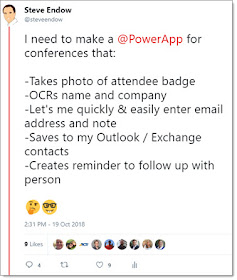By Steve Endow
I recently did some tests to see
how long it takes to import GL Journal Entries with large numbers of line items.
Those test results were fairly consistent, and showed that eConnect does a pretty good job of importing JEs with a large number of lines. Only 8 seconds to import a JE with 2,000 lines seems pretty good to me, as I suspect most customers don't import JEs that large.
For anyone who is familiar with Dynamics GP integrations, the next obvious question is how eConnect handles imports of GL JEs when there is Analytical Accounting data involved.
From experience, I know that GL JEs with AA do not import terribly quickly or efficiently.
Here are the results of importing a single JE with varying line counts. Every line in the JE has one AA code assigned.
100 lines: 3-8 seconds
200 lines: 3-9 seconds
500 lines: 9-17 seconds
1,000 lines: 21-47 seconds
2,000 lines: 174-222 seconds
There are two obvious differences when you add Analytical Accounting codes to your GL JE import.
First, they take much, much longer. A standard JE with 500 lines takes 2 seconds, but when you add AA, that same JE takes 9-17 seconds.
A standard JE with 2,000 lines takes 8 seconds, but when you add AA, that same JE takes 174-222 seconds.
HUUUUUGE decrease in import performance.
The second issue is the incredible variance in import times for the single JEs with AA data. When importing the standard JEs, the import times were completely consistent. Over 10 runs, I might have seen a 1 second variance, if any.
In this test with AA data, I imported the same JE at least 10 times for each line count, and you can see how different the times are. The durations seem almost random. The import times did not gradually increase or decrease--they would just increase on one run, and then decrease on the next.
The times varied from 89% to 200%, which is pretty wild. I don't know how a stored procedure could have so much variance in performance from one run to the next. If it wasn't such a nightmare to trace the activity from the eConnect procedures, I'd look into it.
So there you have it. If you have to import transactions with Analytical Accounting data, you have been warned. It seems that the eConnect procs for AA do not perform well.
Steve Endow is a Microsoft MVP in
Los Angeles. He is the owner of Precipio Services, which provides
Dynamics GP integrations, customizations, and automation solutions.






